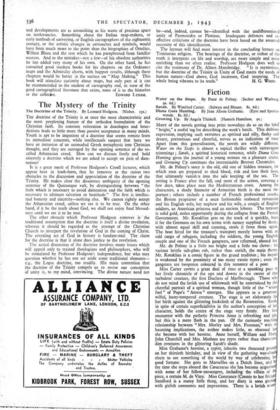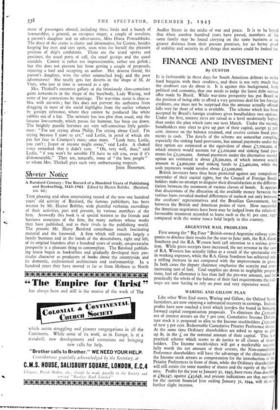Fiction
Water on the Steps. By Peter de Polnay. (Secker and Warburg. 9s. 6d.) Sarah. By Winifred Carter. (Selwyn and Blount. 8s. 6d.)
Diana Goes Hunting. By Jean Alison Grahame. (Eyre and Spottis- woode. 8s. 6d.)
Growing Up. By Angela Thirkell. (Hamish Hamilton. 9s.) MANY of the novels getting into print nowadays do so on the label " bright," a useful tag for describing the week's batch. This dubious
expression, implying such extremes as spirited and silly, flashy and dreary, pretentious and cheerful, serves as an indication of tone: Apart from this generalisation, the novels are wildly different. Water on the Steps is almost a topical thriller with extravagant trimmings ; Sarah, a spirited historical romance, while Diana Goes Hunting gives the journal of a young woman on a pleasure cruise, and Growing Up continues the interminable Boreset Chronicles.
Mr. de Polnay's story is the old, old one of hidden treasure, for which men are prepared to shed blood, risk and lose their lives, that ultimately vanishes into the safe keeping of the sea. The setting is France after the fall, and most of the action, covering a few days, takes place near the Mediterranean coast. Among the characters, a shady financier of Armenian birth is the most im- portant ; others include a number of French professional crooks, the Breton proprietor of a once fashionable seaboard restaurant and his English wife, her nephew and his wife, a couple of English soldiers, an American princess and an ancient lobster. The treasure is solid gold, stolen opportunely during the collapse from the French Government. Mr. Kotaklian gets on the track of it quickly, buys it for the Germans on his own terms with money supplied by them ; with almost equal skill and cunning, steals it from them again. The boat hired for the treasure's transport merely leaves with an odd cargo of refugees, including the soldiers, the young English couple and one of the French gangsters, now reformed, aboard her Mr. de Polnay is a little too bright and a little too clever: his various brittle sub-plots rob, rather than enrich, the main theme. Mr. Kotaklian is a. comic figure in the grand tradition ; his impact is weakened by the proximity of too many exotic types ; even the gangsters are twopence coloured in this romance of a pose.
Miss Carter covers a great deal of time at a spanking pace in her lively chronicle of the ups and downs in the career of that turbulent creature, the first Duchess of Marlborough. Those who do not mind the lavish use of whitewash will be entertained by this cheerful portrait of a spirited woman, though little of the " wisest fool " of Pope's "Atossa " emerges. She appears as a generous, wilful, hasty-tempered creature. The stage is set elaborately for her birth against the glittering backcloth of the Restoration. Sarah, in spite of certain superficialities in the author's conception of her character, holds the centre of the stage very firmly. Her first encounter with the pathetic Princess Anne is refreshing and gay, but this is a mere flash in the pan. Of the curiously touching relationship between "Mrs. Morley and Mrs. Freeman," with its haunting implications, the author makes little, so obsessed hat she become with her heroine. Anne herself, William and Mary, John Churchill and Mrs. Masham are types rather than characters dim creatures in the glittering Sarah's shade.
Miss Grahame's heroine, a typist, inherits two thousand pound' on her thirtieth birthday, and in view of the gathering war-cloud elects to see something of the world by way of celebrating he good fortune. She goes to Marseilles on a Dutch liner, and b the time she steps aboard the Caractacus she has become acquaint with some of her fellow-passengers including the villain of th' piece, a certain M. de Vitry. Miss Constance (Connie to her friends Sandford is a matey little thing, and her diary is soon gush'2 with girlish comments and impressions. There is a lavish assort
ment of passengers aboard, including three lords and a bunch of honourables, a general, an ex-opera singer, a couple of novelists, a parson's daughter and an adventuress, Miss Diana Penruddocke. The diary of the cruise is chatty and informative, for Connie, besides keeping her eyes and ears open, soon wins for herself the pleasant position of ship's confidante. There are the usual sports and pastimes, the usual ports of call, the usual gossips and the usual scandals. Connie is rather too impressionable, rather too girlish ; but this does not prevent her from getting a couple of proposals, rejecting a lord and accepting an author. Her dearest friend, the parson's daughter, wins the other unattached lord; and the poor adventuress? She nearly gets her deserts in the shape of M. de Vitry, who just in time is arrested as a spy. Mrs. Thirkell's extensive gallery of the ferociously class-conscious gains newcomers in the shape of the busybody, Lady Waring, and some of her connexions by marriage. The war-time scene is choc-a- bloc with nit-wits ; but this does not prevent the authoress from dragging in most of the social highlights from the earlier volumes by gossipy, reference, where they cannot be produced like white rabbits out or a hat. The mixture has less plot than usual, and the fatuous low-comedy, which passes for humour, has been cut down. The brightly puerile heroines are very self-conscious little gentle- men : " I'm not crying about Philip, I'm crying about Cecil. I'm crying because I want to cry," said Leslie, in proof of which she put her face in Crumpet's mane once more. " Look here, Leslie, you can't ; Jasper or anyone might come," said Lydia. A choked voice remarked that it didn't care. " Oh, very well, then," said Lydia, " if you won't be sensible I'll have to tell you, even if it's dishonourable." They are, naturally, some of " the best people " to whom Mrs. Thirkell pays such very embarrassing respects.
JOHN HAMPSON.



























 Previous page
Previous page